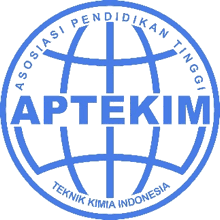Iron Impregnation on Activated Carbon Prepared from Tamarind Wood (Tamarindus Indica L.) as a Potential Catalyst in Biodiesel Production
Abstract
Renewable energy in the form of biodiesel requires a process called transesterification. This process runs slowly, so a catalyst is needed to reduce the activation energy and speed up the reaction rate. Activated carbon is one of the supports in transesterification catalysts because of its high surface area and is proven to be effective in gas or liquid phase reactions. This work aims to study the potential of active carbon from tamarind wood for making catalysts, the characteristics of the catalyst and the optimal concentration of Fe(NO3)3 in the impregnation step. Activated carbon was impregnated using an Ultrasonic Processor with 80% strength at 60 oC for 60 minutes. The impregnation process was carried out with variations of 2, 4, and 6% Fe(NO3)3 dissolved in 0.09M isopropyl alcohol. Variation of processing time 30, 40, 50, 60, 70, 80 minutes. Furthermore, after the activated carbon is allowed to stand for 24 hours, a calcination process is carried out at 300oC to remove impurities. Obtained materials have been characterized by SEM and XRD. The Fe-impregnation process has been successfully carried out on activated carbon made from Tamarind wood (Tamarindus indica L.). In the Fe precursor solution concentration range of 2 – 6%, the higher the concentration of the Fe precursor solution, the higher the impregnated Fe metal. Fe-impregnated activated carbon has the characteristics of being a material consisting of a mixture of crystalline and amorphous phases with even porous surface morphology. This Fe-impregnated activated carbon is a potential material as a catalyst in the biodiesel production process.
Keywords
Full Text:
PDFReferences
Astuti, E., Mufrodi, M. 2019. Optimum condition of biodiesel production from waste cooking oil using continuous stirred tank reactor. International Journal of Smart Grid and Clean Energy. 8(2): 201-205.
Astuti, A., Mufrodi, Z., Linarti, U., Santosa, B., Kumoro, A.C. 2023a. Performance Analysis of Biodiesel Derived from Alkali Catalyzed Transesterification of Waste Cooking Oil. International Journal of Renewable Energy Research. 13(3): 1145-1152.
Astuti, E., Mufrodi, Z., Amelia, S., Zulfi, M. I. and Ramadhani, F. 2023b. Production of Activated Carbon by Activation of Tamarind (Tamarindus Indica) Wood Charcoal. Chemica: Jurnal Teknik Kimia. 10(1): 9-17.
Atmoko, W. P., Widjanarko, D. and Pramono. 2014. Pengaruh Temperatur Pada Proses Transesterifikasi Terhadap Karakteristik Biodiesel Dari Minyak Goreng Bekas. Journal of Mechanical Engineering Learning. 3(1): 39-46.
Augustine, R.L. 1996. Heterogeneous Catalysis for the Synthetic Chemist. New York:Marcel Dekker Inc.
Dewi, T. K., Mahdi, Novriyansyah, T. 2016. Pengaruh rasio reaktan pada impregnasi dan suhu reduksi terhadap karakter katalis kobalt/zeolit alam aktif. Jurnal Teknik Kimia. 22(3): 9-18.
Foroutan, R., Peighambardoust, S. J., Mohammadi, R., Peighambardoust, S.H., Ramavandi, B. 2023. Investigation of kinetics, thermodynamics, and environmental factors of biodiesel generation from sunflower and castor oil using rice husk ash/CuO/K2CO3. Heterogeneous catalyst. 32(103307): 1-15.
Ginting, S., Tarigan, D. Hindryawati, N. 2017. Impregnasi Natrium Hidroksida Pada Karbon Aktif Cangkang Jengkol Sebagai Katalis Dalam Pembuatan Biodiesel. Prosiding Seminar Nasional Kimia 2017. ISBN 978-60250942-0-0.
Hakim, L. Made, D. Nawir, M. 2019. karakterisasi struktur material pasir bongkahan galian golongan c dengan menggunakan x-ray difraction (x-rd) di Kota Palangkaraya. Jejaring Matematika dan Sains. 1(1): 44-51.
Hartono, R., Denny, Y. R., Ramdhani, D. S., Assaat, L. D., Priakbar, A. W., Ribawa, W. H., 2023. Pembuatan biodiesel dengan reaktor bersirkulasi sederhana menggunakan katalis KOH. Jurnal Teknologi. 15(1): 123-132.
Mendez, J.C., Arellano,U., Solís, S., Wang, J.A., and Chen, L.2023. Immobilization of Candida Rugosa lipase on Ca/Kit-6 used as bifunctional biocatalysts for the transesterification of coconut oil to biodiesel. Molecular Catalysis. 533(112793): 1-14.
Murti, S. 2008. Pembuatan Karbon Aktif dari Tongkol Jagung untuk Adsorpsi Molekul Amonia dan Ion Krom. Skripsi. Universitas Indonesia, Depok.
Nasir, M. 2019. Spektrometri Serapan Atom. Aceh: Syiah Kuala University Press.
Putri, C. R. H. 2014. Potensi dan Pemanfaatan Tamaridus indica Dalam Berbagai Terapi. Ilmiah Kedokteran. 3(2):40-54.
Rajpoot, A.S., Choudhary, T., Chelladurai, H., Mishra, S., Shende, V. 2023. Performance analysis of a CI engine powered by different generations of biodiesel; Palm oil, Jatropha, and microalgae. Materials Today: Proceedings. Article in press.
Sarkar, A., Das, P., Laskar, I.B., Vadivel, S., Puzari, A., Pau, B. 2023. Parkia speciosa: A basic heterogeneous catalyst for production of soybean oil-based biodiesel. Fuel. 348(128537): 1-12.
Satterfield, C. N. 1980. Heterogeneous Catalyst in Practice. Mc Graw Hill Book Company, New York
Siregar, M. Z., Ansari. 2020. Penggunaan Katalis Fe Terhadap Karbon Aktif Cangkang Kelapa Sawit Dan KarbonAktif Sekam Padi Pada Proses Impregnasi. Jurnal Vorteks. 1(1): 13-19.
Wahyuni, S., Kadarwati, S. Latifah. 2011. Sintesis Biodiesel Dari Minyak Jelantah Sebagai Sumber Energi Alternatif Solar. Jurnal Sains dan Teknologi. 9(1): 51 – 62.
Wang, Y. T., Wang, X. M., Gao, D., Wang, F. P., Zeng, Y. N., Li, J. G., Jiang, L. Q., Yu, Q., Ji, R., Kang, L. L., Wang, Y. J., Fang, Z. 2022. Efficient production of biodiesel at low temperature using highly active bifunctional Na-Fe-Ca nanocatalyst from blast furnace waste. Fuel. 322(124168): 1-12.
Yuhermita, N., Nazarudin, N., Alfernando O., Prabasari I. G. Haviz, M. 2021. Perengkahan Katalitik Minyak Jelantah Menggunakan Katalis Carbon Yang Dihasilkan Dengan Metode Ion Exchange. Jurnal BiGME. 1(1): 1-22.
Yusnani, A. 2008. Konsentrasi Prekursor Logam dan Metode Impregnasi pada Preparasi NiMo/Zeolit Y Terhadap Karakter Katalis. Skripsi. Surakarta:Universitas Sebelas Maret.
Yusuf, B. O., Oladepo, S. A., Ganiyu, S. A. 2023. Zr-modified desilicated ZSM-5 catalysts as highly active and recyclable catalysts for production of biodiesel from soybean oil: Insight into improved catalyst properties, acidity and dispersion through desilication. Fuel. 351(128729): 1-11.
Refbacks
- There are currently no refbacks.




